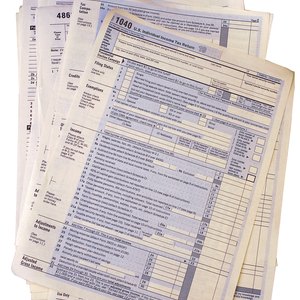
You need learn the differences between a tax return and tax transcript by asking relevant questions. For example, what does a tax return or transcript look like? And what does a tax transcript show compared to a return? The answers to these questions will prevent confusion concerning these documents.
Typically, both tax transcripts and tax returns are IRS documents that provide information regarding your income, assets and tax liability. However, they don't necessarily provide the same picture. A tax transcript shows more limited information than does a tax return, but tax transcripts are easier to acquire than tax returns. Understanding the differences between tax transcripts and tax returns can help you better prepare for your filing deadline.
What Is a Tax Return?
A tax return is the document you file every year with the IRS to report your income for the prior year, along with all the schedules, worksheets and supporting documentation such as the 1099 and W-2 forms.
For individuals, the tax return starts with the Form 1040. Tax returns are fully detailed and include everything you provided to the IRS. If you need one, you can obtain a certified copy for certain court proceedings directly from the IRS.
Obtaining Prior Tax Returns
You can obtain regular copies of prior tax returns by contacting your tax preparer, or if you completed the forms yourself online, the preparation service you used will likely store the returns and charge a fee to obtain a copy. If you do need a certified copy, or if you can't locate a copy on your own, you will have to contact the IRS and complete a Form 4506.
The IRS will generally be able to provide copies of tax returns going back seven years; the cost is around $43 per return requested. You can also use the form to designate a third party to whom the IRS is authorized to send the return. Tax return requests can take up to 60 days to process. So if you need a certified copy for any reason, bear that in mind if you're on a deadline.
What Does Tax Transcript Look Like?
A tax transcript is not as detailed as your original tax return. It is a document created by the IRS at your request that provides information from your return. There are several different types of IRS transcript documents:
1. Tax Return Transcript
A tax return transcript shows most of the line items that appeared on your actual return, including adjusted gross income. However, it does not show any changes you made after filing the original return.
You can only obtain a tax return transcript going back four years, including the current tax year. These types of transcripts are often used for student loan applications and mortgage applications.
Read More: What Is a Tax Transcript?
2. Tax Account Transcript:
A tax account transcript shows less information than a tax return transcript. It provides the type of return, the taxpayer's marital status, the taxable income and the adjusted gross income. It may also show payments you made.
While this type of transcript is more limited, you can obtain one for the current year and up to 10 prior years.
3. Record of Account Transcript
A record of account transcript is the tax return transcript and the tax account transcript combined into one document. Like the tax return transcript, it is only available for the current tax year and the prior three years.
4. Wage and Income Transcript
The wage and income transcript provides the information from your income reporting documents, such as Forms W-2s, 1099s and 1098s. This transcript is available for up to 10 prior tax years.
5. Verification of Non-Filing Letter
If a transcript is requested but there is no record of a filed return for that year, the IRS will send a Verification of Non-Filing Letter. This document is available after June 15 for the current tax year or anytime for the prior three tax years.
Obtaining Prior Tax Transcripts
A tax transcript of any type can be obtained by filing Form 4506-T with the IRS. You can also obtain one online using the IRS' website's Get Your Tax Record page and registering. Ordering a tax transcript is free of charge, and you will usually receive the transcript within five to 10 days of the date the order is processed.
References
Resources
Writer Bio
Rebecca K. McDowell is an attorney focused on debts and finance. She has a B.A. in English and a J.D. She has written finance and tax articles for Zacks and eHow.

